

Josh Groban & Vusi Mahlasela perform "Weeping" at Mandela Day 2009 from Radio City Music Hall. Wouter Basson. Wouter Basson (born 6 July 1950) is a South African cardiologist and former head of the country's secret chemical and biological warfare project, Project Coast, during the apartheid era.[1] Nicknamed "Dr.
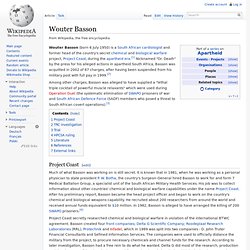
Death" by the press for his alleged actions in apartheid South Africa, Basson was acquitted in 2002 of 67 charges, after having been suspended from his military post with full pay in 1999.[2] Among other charges, Basson was alleged to have supplied a "lethal triple cocktail of powerful muscle relaxants" which were used during Operation Duel (the systematic elimination of SWAPO prisoners of war and South African Defence Force (SADF) members who posed a threat to South African covert operations).[3]
Wouter Basson. Le Dr Mengele sud-africain enfin coupable. Wouter Basson, un médecin sud-africain qui était à la tête d’un programme secret de développement d’armes chimiques, a été déclaré coupable de violation de l’éthique médicale par le Conseil de l’ordre, 11 ans après avoir été acquitté par la justice.
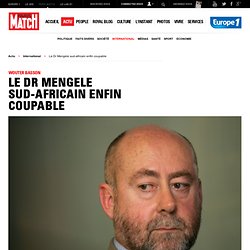
On l’appelait le «Docteur La Mort», qui voulait «trouver des solutions médicales à un problème politique». TRC Episode 02, Part 01. TRC Episode 02, Part 02. TRC Episode 02, Part 03. TRC Episode 02, Part 04. TRC Episode 02, Part 05. TRC Episode 02, Part 06. TRC: Episode 01, Part 01. TRC: Episode 01, Part 02. TRC: Episode 01, Part 03. TRC: Episode 01, Part 04. TRC: Episode 01, Part 05. TRC: Episode 01, Part 06.
TRC: Episode 01, Part 07. TRC: Episode 01, Part 08. TRC: Episode 01, Part 09. TRC: Episode 01, Part 10. TRC: Episode 01, Part 11. TRC: Episode 01, Part 12. AFRIQUE DU SUD # L’implant contraceptif sera désormais gratuit pour toutes les femmes. En 1994, l’Afrique du Sud a autorisé ses habitantes à interrompre gratuitement leurs grossesses au cours des 12 premières semaines et jusqu’à 20 semaines en cas de danger physique ou mental (pour la femme ou le fœtus), de viol ou d’inceste mais également si la grossesse met en péril la situation sociale ou financière de la femme.
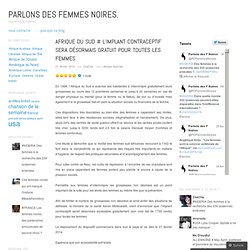
Ces dispositions très favorables au bien-être des femmes a cependant ses limites, elles font face à des résistances sociales (stigmatisation et harcèlement). De plus, seuls 24% des centres de santé publics offrent ce service et les centres privés coûtent très cher, jusqu’à 3200 rands soit 2,5 fois le salaire mensuel moyen (hommes et femmes confondus). Une étude a démontré que la moitié des femmes sud-africaines recourant à l’IVG le font dans la clandestinité ce qui représente des risques très importants en matière d’hygiène, de respect des pratiques sécurisées et d’accompagnement des femmes. Espérons que son accessibilité soit totale. Nelson Mandela. Nelson Rolihlahla Mandela (/mænˈdɛlə/;[4] Xhosa pronunciation: [xoˈliːɬaɬa manˈdeːla]; 18 July 1918 – 5 December 2013) was a South African anti-apartheid revolutionary, politician, and philanthropist who served as President of South Africa from 1994 to 1999.
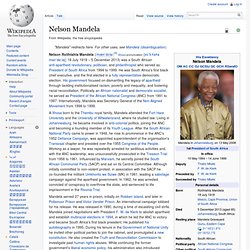
He was South Africa's first black chief executive, and the first elected in a fully representative democratic election. His government focused on dismantling the legacy of apartheid through tackling institutionalised racism, poverty and inequality, and fostering racial reconciliation. Politically an African nationalist and democratic socialist, he served as President of the African National Congress (ANC) from 1991 to 1997. Internationally, Mandela was Secretary General of the Non-Aligned Movement from 1998 to 1999.
Winnie Madikizela-Mandela. She was married to Nelson Mandela for 38 years, including 27 years during which he was imprisoned.
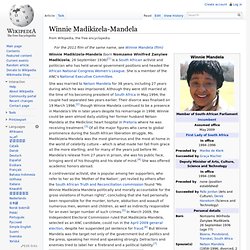
Although they were still married at the time of his becoming president of South Africa in May 1994, the couple had separated two years earlier. Their divorce was finalised on 19 March 1996,[2] though Winnie Mandela continued to be a presence in Mandela's life in later years despite his remarriage in 1998. Winnie could be seen almost daily visiting her former husband Nelson Mandela at the Mediclinic heart hospital in Pretoria where he was receiving treatment.[3] Of all the major figures who came to global prominence during the South African liberation struggle, Ms.
Madikizela-Mandela was the most glamorous and the most at home in the world of celebrity culture – which is what made her fall from grace all the more startling; and for many of the years just before Mr. Early life[edit] Lillian Ngoyi. Lillian Masediba Ngoyi "Ma Ngoyi", (25 September 1911 – 13 March 1980), was a South African anti-apartheid activist.[1][2][3][4] She was the first woman elected to the executive committee of the African National Congress, and helped launch the Federation of South African Women.
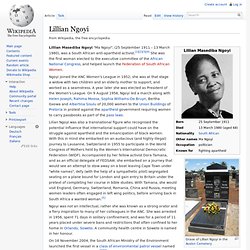
Ngoyi joined the ANC Women's League in 1952; she was at that stage a widow with two children and an elderly mother to support, and worked as a seamstress. A year later she was elected as President of the Women's League. Albert Lutuli. Inkosi Albert John Lutuli (commonly spelled Luthuli;[1] c. 1898 – 21 July 1967), also known by his Zulu name Mvumbi, was a South African teacher and politician.
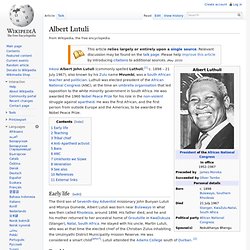
Luthuli was elected president of the African National Congress (ANC), at the time an umbrella organisation that led opposition to the white minority government in South Africa. He was awarded the 1960 Nobel Peace Prize for his role in the non-violent struggle against apartheid. He was the first African, and the first person from outside Europe and the Americas, to be awarded the Nobel Peace Prize. Robert Sobukwe. Steve Biko. Stephen Bantu Biko (18 December 1946 – 12 September 1977)[3] was an anti-apartheid activist in South Africa in the 1960s and 1970s.
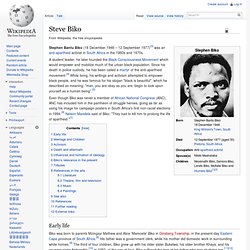
A student leader, he later founded the Black Consciousness Movement which would empower and mobilize much of the urban black population. Since his death in police custody, he has been called a martyr of the anti-apartheid movement.[4] While living, his writings and activism attempted to empower black people, and he was famous for his slogan "black is beautiful", which he described as meaning: "man, you are okay as you are, begin to look upon yourself as a human being".[5] Even though Biko was never a member of African National Congress (ANC), ANC has included him in the pantheon of struggle heroes, going as far as using his image for campaign posters in South Africa's first non-racial elections in 1994.[6] Nelson Mandela said of Biko: "They had to kill him to prolong the life of apartheid.
Art Against Apartheid. Before Nelson Mandela, there was Albert Luthuli.
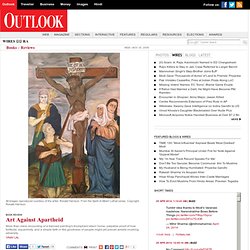
A majestic figure, a hereditary Chief of the Zulus, Luthuli was clearly the most inspirational figure of his generation in South Africa, and his untimely death at the age of 69 in circumstances that can only be described as suspicious robbed South Africa of its most creative exponent of nonviolent resistance to apartheid. Luthuli had joined the African National Congress (ANC) in 1945, and he rose to become president of the provincial Natal branch of the ANC in 1951; the following year, Luthuli was among those who orchestrated resistance to the notorious pass laws. His part in the Defiance Campaign earned him the opprobrium of the government, and he was offered the choice of renouncing his membership in the ANC or being stripped of his Chieftainship.
Woza Albert! Woza Albert!
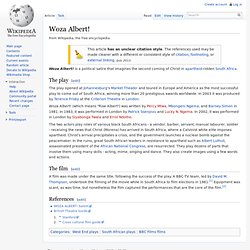
Is a political satire that imagines the second coming of Christ in apartheid-ridden South Africa. The play[edit] Woza Albert! Harry Schwarz. Harry Heinz Schwarz (13 May 1924 – 5 February 2010) was a South African lawyer, statesman and long-time political opposition leader against apartheid in South Africa, who eventually served as the South African ambassador to the United States during the country’s transition to majority rule. As a South African Air Force World War II veteran during the 1950s, Schwarz co-founded the Torch Commando, an ex-soldiers' movement to protest against the disenfranchisement of coloured people in South Africa. Described as South Africa's "most feisty politician" and a political "maverick",[5] he was known for his parliamentary clashes with the apartheid government over its racial and economic policies.
In his political career spanning 43 years, in which he gained respect from across the political spectrum, he never lost an election.[6] In 1988 he received the Order for Meritorious Service and received several Honorary Doctorates. Refugee from Germany[edit] Military service[edit] Bram Fischer. Abram Louis Fischer, commonly known as Bram Fischer, (23 April 1908 Bloemfontein – 8 May 1975 Bloemfontein) was a South African lawyer of Afrikaner descent, notable for anti-apartheid activism and for the legal defence of anti-apartheid figures, including Nelson Mandela at the Rivonia Trial.
Following the trial he was himself put on trial accused of furthering communism. He was sentenced to life imprisonment. He served eleven years and was released in 1975 crippled by the disease from which he died two weeks later. Family and education[edit] Fischer came from a prominent Afrikaner family; his father was Percy Fischer, a Judge President of the Orange Free State, and his grandfather was Abraham Fischer, a prime minister of the Orange River Colony and later a member of the cabinet of the unified South Africa.[1] In 1937, Fischer married Molly Krige, a niece of Jan Smuts; the couple had three children.
Michael Lapsley. Michael Lapsley is a South African Anglican priest and social justice activist. Personal Life[edit] Alan Michael Lapsley SSM, known as Father Michael, was born 2 June 1949 in New Zealand and ordained to the priesthood in Australia where he joined the religious order the Society of the Sacred Mission (SSM). Ruth First. Ruth First (4 May 1925 – 17 August 1982) was a South African anti-apartheid activist and scholar born in Johannesburg, South Africa. She was killed by a parcel bomb addressed specifically to her in Mozambique, where she worked in exile from South Africa. Family and education[edit] Helen Suzman. Helen Suzman, DBE (7 November 1917 – 1 January 2009) was a liberal South African anti-apartheid activist and politician.
Biography[edit] While working from within the system, she earned the respect of Nelson Mandela who praised her courage and credited her with helping to alleviate conditions of incarceration. Always outspoken and independent, she spoke out against the regime but at times opposed Mr. Mandela's policies. She opposed economic sanctions as counter productive and harmful to poor blacks. The ANC and SACP were critical of her method of opposition to Apartheid.
Nelson Mandela en dix citations. 7 Nelson Mandela Quotes You Probably Won't See In The U.S. Media. Mandela : un héritage en question. A Legacy of Freedom - Hello Magnify - Hello Magnify. ‘It is an idea for which I am prepared to die.’ Death, be not proud, though some have called thee Mighty and dreadful, for thou art not so; For those whom thou think’st thou dost overthrow Die not, poor Death, nor yet canst thou kill me (John Donne) For MSU student from South Africa, Mandela changed her life. SA Got Talent 2012-The Madiba Poem. On Nelson Mandela (1918–2013) by J.M. Coetzee. Nelson Mandela has died after a long life—long yet lamentably truncated in that he spent twenty-seven of the best years of his manhood incarcerated at the pleasure of the state. PHOTOS. Mort de Mandela : le monde est en deuil. Un combattant disparaît. Un combattant disparaît On le savait à l'article de la mort depuis le printemps, mais c'est finalement le 5 décembre que Nelson Mandela s'est éteint, au terme d'une vie faite de combats et de quête de la justice.
Emprisonné de longues années sous le régime de l'apartheid, premier président d'une Afrique du Sud "arc-en-ciel", promoteur du dialogue et de la réconciliation, Prix Nobel de la paix, présence forte et souriante, Nelson Mandela restera longtemps dans le cœur des hommes et les livres d'histoire. Il avait 95 ans. Mandela, passeur d'un rêve. L'ancien président a survécu là où tant de ses compagnons sont morts, devenant ainsi le symbole d'une lutte collective, souligne l'hebdomadaire de gauche américain. MoLoRa, by Yael Farber. Les cicatrices en couleur de l'apartheid. Des pointillés de couleurs pour chaque 100 habitants d'Afrique du Sud, disséminés selon leur couleur de peau.